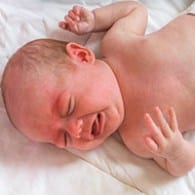Can Prolonged Crying in Newborn Babies Be Bad
The Effects of Excessive Crying
Is Excessive Crying Harmful?
Science tells us that when babies cry lonely and unattended, they feel panic and feet. When trying to empathise if excessive crying is harmful for babies, recall virtually the fact that their bodies and brains are flooded with adrenaline and cortisol stress hormones and when developing brain tissue is exposed to these hormones for prolonged periods, these fretfulness won't form connections to other nerves and will degenerate.
Is it therefore possible that infants who endure many nights or weeks of crying-it-out alone are actually suffering harmful neurological effects that may take permanent implications on the development of sections of their encephalon?
Here is how science answers the question of whether excessive crying is harmful:
Related Manufactures
Chemical and Hormonal Imbalances in the Brain
- Research has shown that infants who are routinely separated from parents in a stressful way accept abnormally high levels of the stress hormone cortisol, as well equally lower growth hormone levels. These imbalances inhibit the development of nerve tissue in the brain, suppress growth, and depress the allowed system. (v, 9, 11, 16)
- Researchers at Yale University and Harvard Medical School found that intense stress early in life can alter the brain's neurotransmitter systems and crusade structural and functional changes in regions of the encephalon like to those seen in adults with low. (17)
- Ane report showed infants who experienced excessive crying episodes were x times more probable to take ADHD as a child, along with poor school performance and antisocial behavior. The researchers concluded these findings may be due to the lack of responsive attitude of the parents toward their babies. (14)
- Dr. Bruce Perry's research at Baylor University may explain this finding. He constitute when chronic stress over-stimulates an infant's brain stem (the part of the brain that controls adrenaline release), and the portions of the brain that thrive on physical and emotional input are neglected (such as when a babe is repeatedly left to cry alone), the child volition grow upwardly with an over-active adrenaline system. Such a child may display increased aggression, impulsivity, and violence afterward in life because the brain stalk floods the body with adrenaline and other stress hormones at inappropriate and frequent times. (6)
- Dr. Allan Schore of the UCLA School of Medicine has demonstrated that the stress hormone cortisol (which floods the brain during intense crying and other stressful events) actually destroys nerve connections in disquisitional portions of an infant's developing brain. In addition, when the portions of the brain responsible for attachment and emotional command are not stimulated during infancy (as may occur when a baby is repeatedly neglected) these sections of the brain will not develop. The result – a violent, impulsive, emotionally unattached child. He concludes that the sensitivity and responsiveness of a parent stimulates and shapes the nerve connections in key sections of the brain responsible for zipper and emotional well-being. (7, 8)
Decreased Intellectual, Emotional, and Social Development
- Baby developmental specialist, Dr. Michael Lewis, presented research findings at an American Academy of Pediatrics meeting, concluding that, "The single most important influence of a child's intellectual evolution is the responsiveness of the mother to the cues of her baby."
- Researchers take establish babies whose cries are normally ignored will not develop healthy intellectual and social skills. (19)
- Dr. Rao and colleagues at the National Institutes of Wellness showed that infants with prolonged crying (but non due to colic) in the first 3 months of life had an average IQ 9 points lower at 5 years of age. They also showed poor fine motor development. (ii)
- Researchers at Pennsylvania State and Arizona State Universities found that infants with excessive crying during the early months showed more than difficulty controlling their emotions and became even fussier when parents tried to console them at 10 months. (15)
- Other research has shown that these babies have a more annoying quality to their weep, are more clingy during the day, and take longer to get independent as children. (1)
Harmful Physiologic Changes
- Fauna and homo research has shown when separated from parents, infants and children bear witness unstable temperatures, center arrhythmias, and decreased REM sleep (the stage of sleep that promotes brain evolution). (x, 12, 13)
- Dr. Brazy at Duke University and Ludington-Hoe and colleagues at Case Western Academy showed in 2 separate studies how prolonged crying in infants causes increased claret pressure in the brain, elevates stress hormones, obstructs claret from draining out of the brain, and decreases oxygenation to the brain. They ended that caregivers should answer cries swiftly, consistently, and comprehensively. (three, 4)
Sources:
- P. Heron, "Not-Reactive Cosleeping and Child Behavior: Getting a Proficient Night's Sleep All Night, Every Night," Chief's thesis, Department of Psychology, Academy of Bristol, 1994.
- Thou R Rao, et al; Long Term Cognitive Development in Children with Prolonged Crying, National Institutes of Health, Archives of Disease in Childhood 2004; 89:989-992.
- J pediatrics 1988 Brazy, J Due east. Mar 112 (3): 457-61. Duke University
- Ludington-Hoe SM, Case Western U, Neonatal Network 2002 Mar; 21(two): 29-36
- Butler, South R, et al. Maternal Behavior as a Regulator of Polyamine Biosynthesis in Brain and Middle of Developing Rat Pups. Science 1978, 199:445-447.
- Perry, B. (1997), "Incubated in Terror: Neurodevelopmental Factors in the Wheel of Violence," Children in a Violent Society, Guilford Press, New York.
- Schore, A.Due north. (1996), "The Experience-Dependent Maturation of a Regulatory System in the Orbital Prefrontal Cortex and the Origen of Developmental Psychopathology," Development and Psychopathology 8: 59 – 87.
- Karr-Morse, R, Wiley, Yard. Interview With Dr. Allan Schore, Ghosts From the Nursery, 1997, pg 200.
- Kuhn, C M, et al. Selective Depression of Serum Growth Hormone During Maternal Deprivation in Rat Pups. Science 1978, 201:1035-1036.
- Hollenbeck, A R, et al. Children with Serious Disease: Behavioral Correlates of Separation and Solution. Kid Psychiatry and Human being Evolution 1980, 11:three-xi.
- Coe, C L, et al. Endocrine and Immune Responses to Separation and Maternal Loss in Not-Human being Primates. The Psychology of Attachment and Separation, ed. One thousand Reite and T Fields, 1985. Pg. 163-199. New York: Academic Press.
- Rosenblum and Moltz, The Mother-Infant Interaction as a Regulator of Baby Physiology and Beliefs. In Symbiosis in Parent-Offspring Interactions, New York: Plenum, 1983.
- Hofer, Thousand and H. Shair, Control of Sleep-Wake States in the Infant Rat by Features of the Mother-Baby Relationship. Developmental Psychobiology, 1982, 15:229-243.
- Wolke, D, et al, Persistent Infant Crying and Hyperactivity Problems in Middle Childhood, Pediatrics, 2002; 109:1054-1060.
- Stifter and Spinrad, The Issue of Excessive Crying on the Evolution of Emotion Regulation, Infancy, 2002; 3(2), 133-152.
- Ahnert 50, et al, Transition to Child Intendance: Associations with Babe-mother Attachment, Infant Negative Emotion, and Cortisol Elevations, Child Development, 2004, May-June; 75(3):649-650.
- Kaufman J, Charney D. Furnishings of Early Stress on Encephalon Structure and Function: Implications for Agreement the Relationship Betwixt Child Maltreatment and Depression, Developmental Psychopathology, 2001 Summer; xiii(three):451-471.
- Teicher MH et al, The Neurobiological Consequences of Early on Stress and Childhood Maltreatment, Neuroscience Biobehavior Review 2003, Jan-Mar; 27(1-2):33-44.
- Leiberman, A. F., & Zeanah, H., Disorders of Attachment in Infancy, Infant Psychiatry 1995, 4:571-587.
Source: https://www.askdrsears.com/topics/health-concerns/fussy-baby/science-excessive-crying-harmful/



0 Response to "Can Prolonged Crying in Newborn Babies Be Bad"
Post a Comment